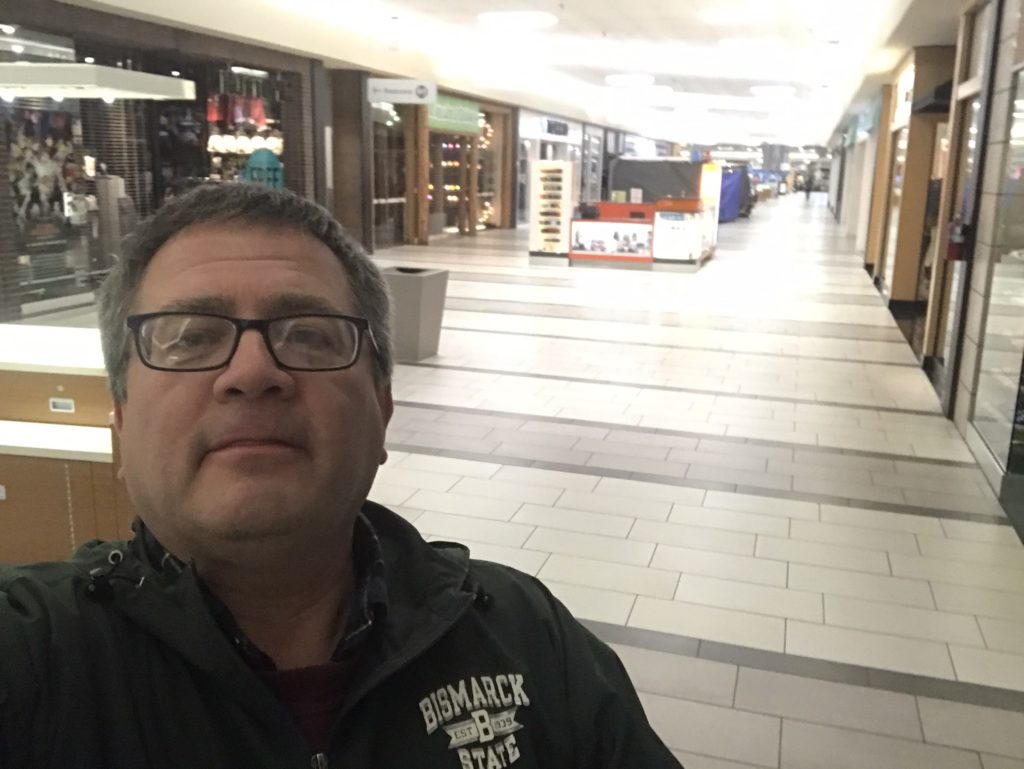Letters from Communities in the Time of Coronavirus
The American Communities Project has been reaching out to communities we visited over the past two years to understand how they’re being affected by and coping with the Covid-19 crisis. Dispatches from eight residents in Arkansas, Kansas, Ohio, and North Dakota show how people are pulling together in a variety of ways to weather the uncertainty and meet essential needs of learning, worshiping, working, and nourishing.
In Fulton County, Arkansas, in Working Class Country
From Pastor John Hodges at Salem First Baptist Church in Salem, Arkansas:
As a church we are doing good. Using social media to do ministry. We have closed the doors to the church the last two Sundays and for the foreseeable future. We are staying in touch with the membership through phone ministry. Supporting the elderly and impoverished with food drop off at their doorstep. Trying to keep people positive and in a supportive mindset. During this time our ministry objective is threefold:
- We live by Faith not by Fear
- We are Sacrificial not Selfish
- We will let our Light shine and not Hide it
Our schools are closed, but students are working from home. The biggest challenges we face are fear, uncertainty, and moderate depression at this point. My concerns as this crisis deepens are on our dysfunctional and impoverished families. Being in close proximity for long periods of time is one of my greatest fears for children. I am praying, and we are doing what we can from a distance.
From Daniel Busch, Mayor of Salem, Arkansas
Our current situation in Fulton County is we have 0 cases being reported. Most larger businesses have closed their lobbies to customers. (Banks and National Arkansas Electric Cooperative) The restaurants in town have gone to dine out only. The grocery store is staying busy and constantly having to restock their shelves.
All schools in the state are closed until further notice. They are given AMI packets (alternative method of instruction) to work on from home. Trying our best to practice social distancing. There are always the few that think this is all crazy, but for the most part everyone is doing their part.
In St. Francis County, Arkansas, in the African American South
From Cathie Cline, Ed.D., President of East Arkansas Community College:
This has been a difficult time. Long days and nights.
On the upside, I think our grocery stores have been less hard hit than urban ones, although there are shortages. Being in a small town is great in some respects. We will take care of our neighbors. The city mayor has pulled together every community leader, and we are working together to share resources. The doctors, hospital, social agencies, religious leaders, higher education, etc. are all on the same page, led by our mayor. Our allied health building was built to serve as hospital overflow.
There are many HR issues to work on with little guidance. We are doing the best we can with work from home, but helping students at this college has a lot of in-person components. Rural areas do not have the high speed internet access that urban areas have. We have one instructor who lives in the middle of a national forest, for example.
My college cannot just say, “We’re going online for the rest of the semester.” Our students are not as well-skilled or well-resourced as university students. We are strictly limiting the number of students allowed on campus, but we have to allow some. Employers are looking for our graduates ASAP. For example, truck driving. We are splitting them into pairs on one truck with one instructor. The employers need them. Goods are still traveling the nation.
We have called every student and are working to acquire laptops and hot spots, at our expense, for those who do not have access to a good device or internet. None of the companies who claim to be providing students with free internet do so in rural areas. We are providing snack-sized take-home bags of food for students, at our expense; however, their already tenuous transportation arrangements are stretched even thinner.
We are making sure each student was contacted by at least 2 staff members last week and this week, in addition to instructor contacts. We have set up a special email Care@eacc.edu that allows students to email any problem they have. This is being monitored by a vice president at all times to be sure action is taken.
We are primarily focusing on what we can do to show students that we care about them, and that they are not alone. We always help students succeed despite a myriad of challenges. This is simply the latest one.
In Finney County, Kansas, a Hispanic Center
From Allie Medina, Human Resources Director in the City of Garden City:
Currently, the City building is closed to walk-in traffic, but appointments can still be made, and staff are directing members of the public to phone or website services to continue to conduct business. The City has electric, water, waste water, and various other departments working in shifts in order to minimize exposure of staff.
The City of Garden City has been working with Finney County Health Department to have COVID-19 flyers printed in four languages in order to get messaging out to all community members.
At this time, Kansas schools are closed, but the school district has scheduled breakfast and lunches that can be accessed for children through pickup options to ensure children do not go without meals due to the school closure. The school district released information in four different languages. The district has also developed online learning options for students for the remainder of the school year.
From Shannon Dick, Strategic Analyst at Finney County Economic Development Corporation:
The community has really stepped up and is doing the best they can to “fill the gaps” as they come up.
Our schools are starting on “continuing education” (shifting to an online format), but have already developed a meals program where any kid 18 and under can get a breakfast and a lunch each day no questions asked, the school system has 25 drive-up locations around town for the kids to get those meals.
While churches are not closed yet, almost all have gone to an online format with services (and even have extra services through the week) being streamed on Facebook. One of our large, technologically advanced churches has been working with the other smaller (and older demographics) churches to get everything going online and has even allowed other pastors to use their facilities to record and distribute church services.
Restaurants have all moved to curbside or delivery options with only a handful left that allow limited dine in. The Zoo and library are both doing daily videos for kids on Facebook, so that is neat to watch. There has also been a big community “bear hunt” for the kids that people organized and last Friday there was a huge cruising Main St. event.
Many of our businesses are essential due to their relation to food production, so for the most part everything is just continuing on. Most other offices in town have implemented some form of working from home.
As of this week we have one case of COVID-19.
Our biggest challenge is not having schools in session but parents still working (specifically the case with Tyson). We are working at the state level to have the ability to open new temporary child care centers like Ohio has done.
From Shane Knoll, a farmer in Finney County:
We are doing good out here. So far we have one confirmed case of Covid in Finney County. Myself and neighbor farmers are somewhat concerned about the virus. So many unknowns right now I guess. We have changed our lifestyle somewhat. Only going into town when we need to and staying around the house more often. It’s definitely been a change with the kids around the farm more. We are getting better with time management now! With the kids now out of school for the rest of the year, we have to dedicate some time every day to help them with their online zoom school meetings.
I’m a little worried about having the ag inputs and parts for a crop this year. But I tend to worry a lot and everything will probably work out just fine! I’ve talked to some people in agriculture related businesses, and it sounds like they are going to do everything they can to take care of their customers. Some ag input suppliers have gone to a curbside pickup where we do not have to get out of the vehicle. As of now, it’s business as usual out here. Livestock producers could have it the toughest. They HAVE to go out every day and take care of their livestock. I only have one chance to make a crop a year and the farms livelihood depends on getting a crop in the ground. We normally start planting corn/sorghum May 1–June 10. So we have some time yet.
In Lake County, Ohio, a Middle Suburb
From Sharon Graper, Director of Academics at Holden Forests & Gardens:
We have shut down the Arboretum and the Botanical Garden as directed by the Ohio governor through April. We shall see how it all goes. This past Monday we laid off a substantial number of employees as the months of March, April, and May produce a lot of our revenue. We also expect that philanthropic giving will be way down as will the income from our endowment. Tough times all around. We are all working remotely expect for a few horticulturalists, security, animal care staff.
I am on vacation in Georgia if you can call it a vacation. Was supposed to be in the Bahamas. My son who is a senior will probably miss prom, graduation, senior project and cannot visit his top college choices on admitted student days. His school is starting remote learning. He has a great school (private) so I think that will work out okay. We are trying at HF&G to get some cool online recourses up. That is the only bright side, as that is kind of exciting and something we have wanted to work on for a while.
In Morton County, North Dakota, in Rural Middle America
From John Saiki, Morton County Engineer:
Due to the coronavirus threat, we have changed our operations a little. The office is closed to the public. Anyone needing to contact us is supposed to go to the Morton County website first, contact us by telephone and then make an appointment to meet in person if necessary.
The day-to-day operations, grading, bridge repairs, etc. haven’t changed, since our workers are somewhat isolated. Our daily briefings in the morning have changed, to keep the number in the group below 10 people. One group starts at 6:30 am and finishes at 5:00 pm and the second group starts at 7:00 am and works until 5:30 pm. Those of us from the Highway Department are prohibited from visiting the courthouse for the time being. The Risk Manager for the County is choosing to err on the side of caution. I believe they are still working on the logistics for public meetings, such as the Planning & Zoning Commission and County Commission meetings.
I live in an apartment in downtown Bismarck, and it is so surreal walking downtown. The downtown is so deserted — restaurants, bank lobbies, businesses — are all closed. The parking on the streets is empty.
I went for a walk around the downtown and walked to Kirkwood Mall, which was open for walkers. Target was the only store open. The security guard and I were the people walking around in the mall.
As I was typing, I was listening to the song “Stranger in a Strange Land” by Leon Russell. It seems appropriate this week.

